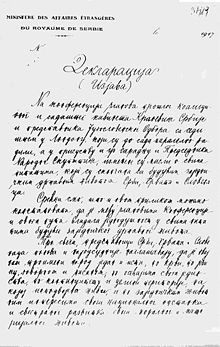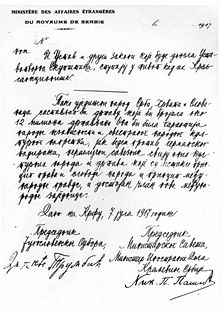Corfu Declaration
| Corfu Declaration | |
|---|---|
 Serbian Historical Archives | |
| Created | 20 July 1917 |
| Location | Corfu, Greece |
| Author(s) | Nikola Pašić and Ante Trumbić |
| Signatories | Nikola Pašić for Kingdom of Serbia and Ante Trumbić for Yugoslav Committee |

The Corfu Declaration is the agreement that made the creation of the Kingdom of Yugoslavia possible.
Contents
1 History
2 See also
3 References
4 External links
History
In 1916, the Serbian Parliament in exile proposed the creation of the Kingdom of Yugoslavia at a meeting inside the Municipal Theatre of Corfu, Greece.[1] The declaration was signed during World War I on the island of Corfu on 20 July 1917, by the Yugoslav Committee of politicians in exile, that represented Slovenes, Croats and Serbs living in Austria-Hungary and the representatives of the Kingdom of Serbia, with political sponsorship of Great Britain and France, under their avowed principles of national self-determination.
The Declaration as the first step toward building the new State of Yugoslavia envisaged a parliamentary monarchy under the Karađorđević dynasty, with indivisible territory and unitary power, with the three national denominations and the Latin and Cyrillic alphabets equal before the law, religious freedom and universal suffrage. It provided for a Constituent Assembly to establish a Constitution that would be the origin of all powers.
"This State will be a guarantee of their national independence and of their general national progress and civilization, and a powerful rampart against the pressure of the Germans", the Declaration concluded.
The two chiefly responsible for devising the wording of the Corfu Declaration were the Serbian Prime Minister Nikola Pašić and the Croatian exile Ante Trumbić, who worked to overcome official Serbian resistance. Pašić and the Serbian Court Party had remained intent upon the simple expansion of a Greater Serbia by means of unilateral territorial gains to be derived from a beaten Austro-Hungarian Empire. The outbreak of the February Revolution in Russia had withdrawn Serbia's Major Power champion from the diplomatic table. Pašić compromised, signed the Declaration and began to work behind the scenes in an attempt to discredit the Yugoslav Committee, lest the Allied Powers regard the Committee as the rightful government-in-exile at the coming Armistice.
As a result of all events, the Kingdom of Serbs, Croats and Slovenes was created on December 1, 1918. Trumbić was named Foreign Minister, and Pašić found himself temporarily out of power.
See also
- Niš Declaration
References
^ History of the municipal theatre Archived February 4, 2008, at the Wayback Machine. from Corfu cityhall Quote: "The Municipal Theatre was not only an Art-monument but also a historical one. On its premises the exiled Serbian parliament, the Skoupsina, held up meetings in 1916, which decided the creation of the new Unified Kingdom of Yugoslavia."
External links
The Corfu Declaration on FirstWorldWar.com
The text of the Corfu Declaration (in Serbian)
